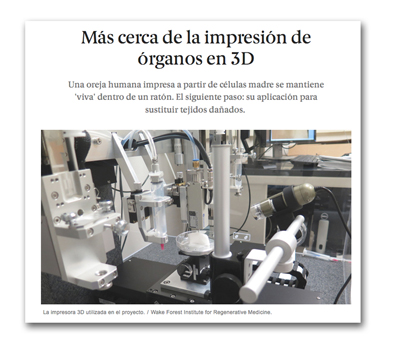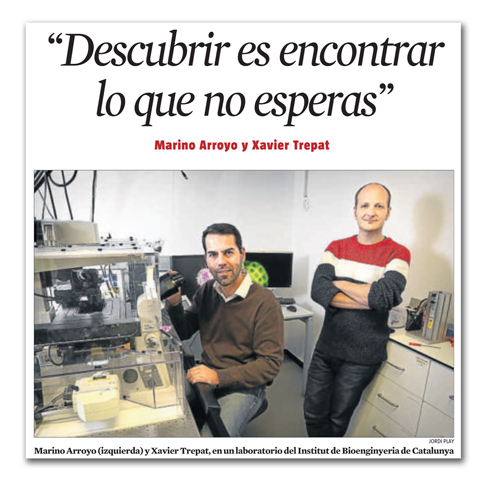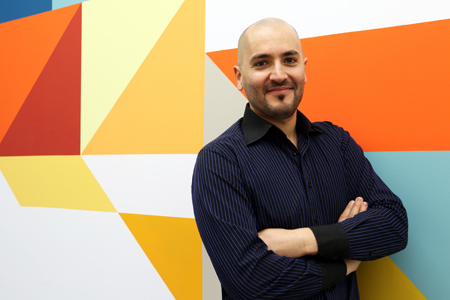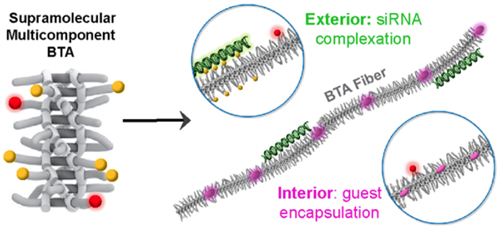 Àngels López
Àngels López
“Micromotores, el próximo paso en el transporte de fármacos”
 Samuel Sanchez’s recent Nature Communications paper on micromotors that use surface variations for docking and guiding was the subject of an article in El Mundo today.
Samuel Sanchez’s recent Nature Communications paper on micromotors that use surface variations for docking and guiding was the subject of an article in El Mundo today.
Help for the homeless
 On Monday IBEC Managing Director David Badia (left), on behalf of IBEC’s employees, presented the €665 raised by the institute at last December’s Christmas Celebration to the Arrels Fundació, a charity for the homeless in Barcelona’s Raval district.
On Monday IBEC Managing Director David Badia (left), on behalf of IBEC’s employees, presented the €665 raised by the institute at last December’s Christmas Celebration to the Arrels Fundació, a charity for the homeless in Barcelona’s Raval district.
Arrels director Ferran Busquets (right) was delighted to receive the funds, which were raised by generous IBECers who bought tickets for the tombola on 17th December. The money will go towards helping the 400 Arrels volunteers reach out to more than 1600 homeless people per year with support by way of clothing, medicine, psychological aid and accommodation.
“It was good to get to know more about the role of Arrels Fundació as an NGO in our city, and it also offered a chance for us to explain what IBEC is about,” commented David, who visited the foundation with Events Coordinator Pilar Jiménez.
Postdoctoral Position in Membrane Mechanobiology (Ref. PD-PR)

Application Deadline: 06/03/2016
Ref: PD-PR
The Cellular and Molecular Mechanobiology group at the Institute for Bioengineering of Catalonia (IBEC) , led by Dr. Pere Roca-Cusachs, is looking for a Postdoctoral candidate to work in membrane mechanobiology, conducting research towards discovering and understanding membrane-mediated mechanosensing processes.
This position might be co-funded by the Severo Ochoa Program from the Spanish Ministry of Economy and Competitivity (MINECO).
Tècnic de Suport a la Recerca (Ref. TR-GG)
 Application Deadline: 06/03/2016
Application Deadline: 06/03/2016
Ref: TR-GG
El grup de Caracterització Bioelèctrica a la Nanoescala de l’Institut de Bioenginyeria de Catalunya (IBEC) requereix incorporar un/a Tècnic de Suport a la Recerca per a realitzar un treball de col·laboració amb el grup de Biofísica de Biomembranes de la Universitat de Barcelona, dins el marc del Grup de Recerca Consolidat en Nanobioenginyeria i Bioelectrònica.
HealthTech Cluster outlines plans for 2016
 The General Assembly of HealthTech Cluster, a consortium of companies, hospitals and research centres, including IBEC, took place at the UPC’s Campus Nord yesterday.
The General Assembly of HealthTech Cluster, a consortium of companies, hospitals and research centres, including IBEC, took place at the UPC’s Campus Nord yesterday.
The meeting approved HealthTech Cluster’s strategic plan for 2016, with some of the main working groups focused on will be innovation, internationalisation and networking. The programme of presentations included IBEC Associated Researcher Alicia Casals, who gave a talk entitled “Robòtica Intel·ligent i Sistemes Assistencials“, and there was also a visit to her laboratory afterwards.
HealthTech Cluster was launched in July 2014 by ACCIO to promote the competitiveness of health technologies in Catalonia.
“Más cerca de la impresión de órganos en 3D”
 IBEC Director Josep Samitier gives his expert opinion in an El Español article about the future of 3D printing applied to biomedicine.
IBEC Director Josep Samitier gives his expert opinion in an El Español article about the future of 3D printing applied to biomedicine.
“Descubrir es encontrar lo que no esperas”
 Xavier Trepat and the UPC’s Marino Arroyo had their turn at being profiled in La Vanguardia on Sunday as finalists in this year’s edition of the newspaper’s Science Award.
Xavier Trepat and the UPC’s Marino Arroyo had their turn at being profiled in La Vanguardia on Sunday as finalists in this year’s edition of the newspaper’s Science Award.
IBEC’s newest junior group leader: Vito Conte
 Vito Conte may be familiar to many, having spent more than four years in Xavier Trepat’s Integrative Cell and Tissue Dynamics group, first as a postdoc and later as a Juan de la Cierva fellow. Vito now is a Ramon y Cajal fellow and leads the Mechanics of Development and Disease group, which will take a new direction as he develops new biophysical tools to quantify the mechanics of cell and tissues in 3D environments.
Vito Conte may be familiar to many, having spent more than four years in Xavier Trepat’s Integrative Cell and Tissue Dynamics group, first as a postdoc and later as a Juan de la Cierva fellow. Vito now is a Ramon y Cajal fellow and leads the Mechanics of Development and Disease group, which will take a new direction as he develops new biophysical tools to quantify the mechanics of cell and tissues in 3D environments.
“With a strong background in studying how cell and tissue mechanics determine structure and function from my time as a postdoc, I want to carry on exploring the physical mechanisms of development and disease in biological organisms” says Vito, who completed his PhD in biomechanical engineering at King’s College London in the group of Prof. Mark Miodownik, now director of the Institute of Making at UCL. “To do this, my group will develop novel tools to carry out in vivo and in vitro mechanical measurements, which we will integrate into 2D and 3D models of the biological organisms being studied.”
Playing with molecular Lego to build the next generation of drug delivery vectors
 Many drugs are hindered in their therapeutic potential by issues such as too-fast clearance by the kidneys, undesirable properties, lack of selectivity, and poor internalization in the cell. Nanotechnology has the potential to alter the landscape of medicine by providing targeted solutions for the delivery of small-molecule drugs and biopharmaceuticals.
Many drugs are hindered in their therapeutic potential by issues such as too-fast clearance by the kidneys, undesirable properties, lack of selectivity, and poor internalization in the cell. Nanotechnology has the potential to alter the landscape of medicine by providing targeted solutions for the delivery of small-molecule drugs and biopharmaceuticals.
Now, new IBEC junior group leader Lorenzo Albertazzi and his former colleagues at the Eindhoven University of Technology, working together with industry partner Novartis, have made a leap in drug delivery vectors by developing a new type of carrier with some groundbreaking improvements.

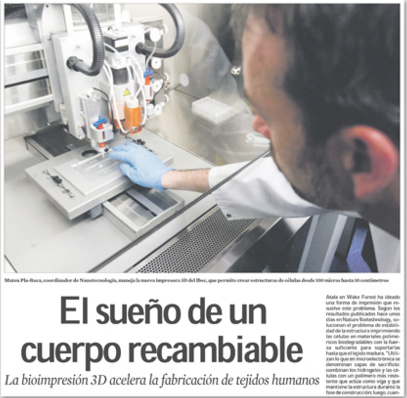
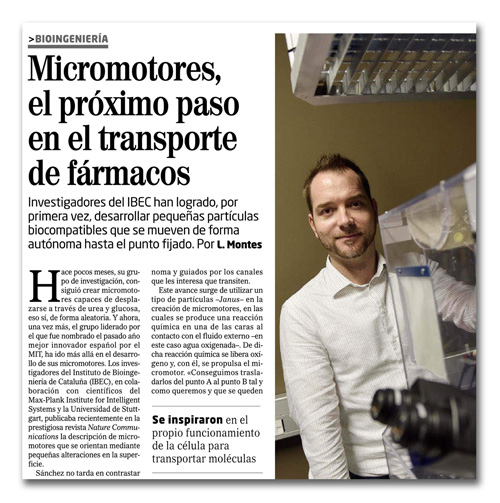
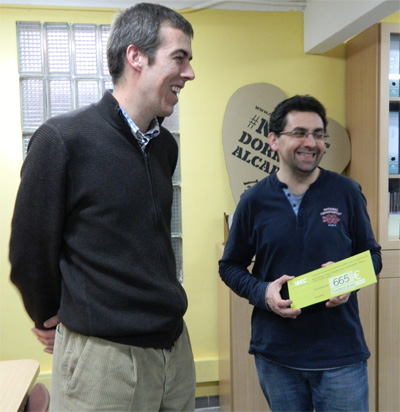
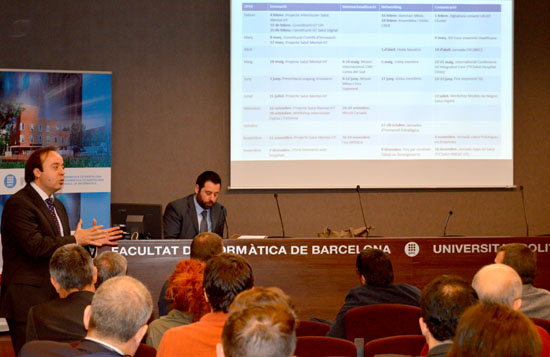
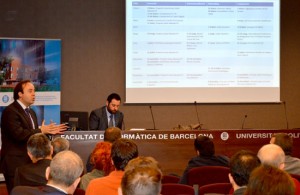 The General Assembly of HealthTech Cluster, a consortium of companies, hospitals and research centres, including IBEC, took place at the UPC’s Campus Nord yesterday.
The General Assembly of HealthTech Cluster, a consortium of companies, hospitals and research centres, including IBEC, took place at the UPC’s Campus Nord yesterday.